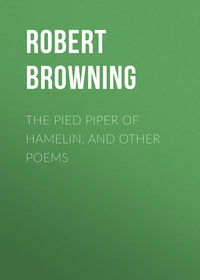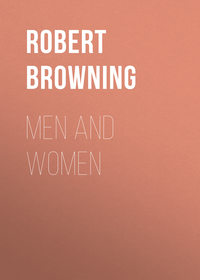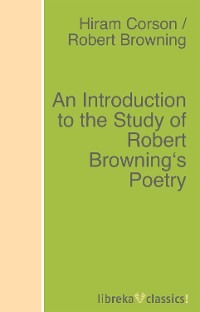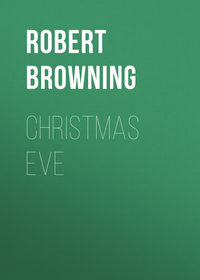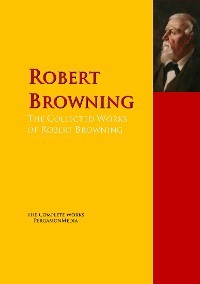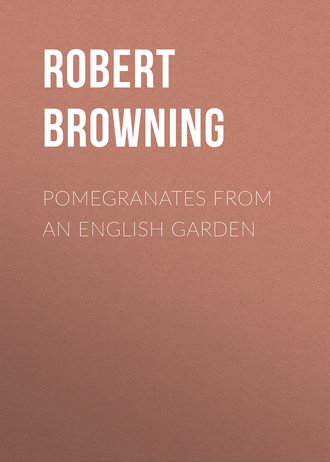 полная версия
полная версияPomegranates from an English Garden
To this solemn question a friendly answer seems to come from Common Sense, assuring him that all would be right; for, though his ship might not sail very grandly into the eternal haven, it was enough if, in whatever state of wreck, it arrived at all; which leads him to utter the deepest wish and expectation of his heart: —
Would the ship reach home!I wish indeed “God’s kingdom come – ”The day when I shall see appearHis bidding, as my duty, clearFrom doubt! And it shall dawn, that day,Some future season; Easter mayProve, not impossibly, the time —Yes, that were striking – fates would chimeSo aptly! Easter-morn, to bringThe Judgment! – deeper in the springThan now, however, when there’s snowCapping the hills; for earth must showAll signs of meaning to pursueHer tasks as she was wont to do– The skylark, taken by surpriseAs we ourselves, shall recogniseSudden the end. For suddenlyIt comes; the dreadfulness must beIn that; all warrants the belief —“At night it cometh like a thief,”I fancy why the trumpet blows;– Plainly, to wake one. From reposeWe shall start up, at last awakeFrom life, that insane dream we takeFor waking now.* * * * *The next stanza gives the famous description of the fiery aurora, when even “the south firmament with north-fire did its wings refledge!” (Compare description of lunar rainbow in “Christmas-Eve.”) He feels sure that his wish is realized, and the Judgment Day has come!
XV* * * * *I foundSuddenly all the midnight roundOne fire. The dome of heaven had stoodAs made up of a multitudeOf handbreadth cloudlets, one vast rackOf ripples infinite and black,From sky to sky. Sudden there went,Like horror and astonishment,A fierce vindictive scribble of redQuick flame across, as if one said(The angry scribe of Judgment) “There —“Burn it!” And straight I was awareThat the whole ribwork round, minuteCloud touching cloud beyond compute,Was tinted, each with its own spotOf burning at the core, till clotJammed against clot, and spilt its fireOver all heaven, which ’gan suspireAs fanned to measure equable, —Just so great conflagrations killNight overhead, and rise and sink,Reflected. Now the fire would shrinkAnd wither off the blasted faceOf heaven, and I distinct might traceThe sharp black ridgy outlines leftUnburned like network – then, each cleftThe fire had been sucked back into,Regorged, and out it surging flewFuriously, and night writhed inflamed,Till, tolerating to be tamedNo longer, certain rays world-wideShot downwardly. On every sideCaught past escape, the earth was lit;As if a dragon’s nostril split,And all his famished ire o’erflowed;Then as he winced at his lord’s goad,Back he inhaled: whereat I foundThe clouds into vast pillars bound,Based on the corners of the earth,Propping the skies at top: a dearthOf fire i’ the violet intervals,Leaving exposed the utmost wallsOf time, about to tumble inAnd end the world.XVII felt beginThe Judgment-Day: to retrocedeWas too late now. “In very deed,”(I uttered to myself) “that Day!”The intuition burned awayAll darkness from my spirit too:There, stood I, found and fixed, I knew,Choosing the world. The choice was made;And naked and disguiseless stayed,And unevadable, the fact.My brain held ne’ertheless compactIts senses, nor my heart declinedIts office; rather, both combinedTo help me in this juncture. ILost not a second, – agonyGave boldness: since my life had endAnd my choice with it – best defend,Applaud both! I resolved to say,“So was I framed by thee, such way“I put to use thy senses here!“It was so beautiful, so near,“Thy world, – what could I then but choose“My part there? Nor did I refuse“To look above the transient boon“Of time; but it was hard so soon“As in a short life, to give up“Such beauty: I could put the cup“Undrained of half its fulness, by;“But, to renounce it utterly,“ – That was too hard! Nor did the cry“Which bade renounce it, touch my brain“Authentically deep and plain“Enough to make my lips let go.“But thou, who knowest all, dost know“Whether I was not, life’s brief while,“Endeavouring to reconcile“Those lips (too tardily, alas!)“To letting the dear remnant pass,“One day, – some drops of earthly good“Untasted! Is it for this mood,“That thou, whose earth delights so well,“Hast made its complement a hell?”XVIIA final belch of fire like blood,Overbroke all heaven in one floodOf doom. Then fire was sky, and skyFire, and both, one brief ecstasy,Then ashes. But I heard no noise(Whatever was) because a voiceBeside me spoke thus, “Life is done,“Time ends, Eternity’s begun,“And thou art judged for evermore.”As in “Christmas-Eve,” the question rises of a Presence in the awful scene.
XIX* * * * *What if, ’twixt skiesAnd prostrate earth, he should surpriseThe imaged vapour, head to foot,Surveying, motionless and mute,Its work, ere, in a whirlwind raptIt vanish up again? – So haptMy chance. He stood there. Like the smokePillared o’er Sodom, when day broke, —I saw him. One magnific pallMantled in massive fold and fallHis head, and coiled in snaky swathesAbout his feet: night’s black, that bathesAll else, broke, grizzled with despair,Against the soul of blackness there.A gesture told the mood within —That wrapped right hand which based the chinThat intense meditation fixedOn his procedure, – pity mixedWith the fulfilment of decree.Motionless, thus, he spoke to me,Who fell before his feet, a mass,No man now.Then follows the Sentence, excluding him from the heaven of spirit, and leaving him to the world of sense, hopeless for ever of anything higher – a sentence which seemed to him at first to be rather a reward than a punishment, as he thought of “earth’s resources – vast exhaustless beauty, endless change of wonder!” Even a fern-leaf a museum in itself!
The answer of the Voice to this shallow thought leads us into the very loftiest regions of the imagination, suggesting views of the future of the redeemed which make the soul thrill with eager expectancy —
XXIVThen the Voice, “Welcome so to rate“The arras-folds that variegate“The earth, God’s antechamber, well!“The wise, who waited there, could tell“By these, what royalties in store“Lay one step past the entrance-door.“For whom, was reckoned, not too much,“This life’s munificence? For such“As thou, – a race, whereof scarce one“Was able, in a million,“To feel that any marvel lay“In objects round his feet all day;“Scarce one in many millions more,“Willing, if able, to explore“The secreter, minuter charm!“ – Brave souls, a fern-leaf could disarm“Of power to cope with God’s intent, —“Or scared if the south firmament“With north-fire did its wings refledge!“All partial beauty was a pledge“Of beauty in its plenitude:“But since the pledge sufficed thy mood,“Retain it! plenitude be theirs“Who looked above!”At this answer “sharp despairs shot through” him, at the thought of what he had missed; but on reflection he finds comfort in the prospect of the possibilities of Art. Again the inexorable voice is heard, pronouncing loss unspeakable. Even if he could be a Michelangelo (Buonarroti), it would be only the initial earthly stage of his development that was possible for him. (The whole passage is magnificent; but perhaps the exquisitely wrought-out illustration of the lizard in its narrow rock-chamber will be most enjoyed.)
XXVI* * * * *“If such his soul’s capacities,“Even while he trod the earth, – think, now,“What pomp in Buonarroti’s brow,“With its new palace-brain where dwells“Superb the soul, unvexed by cells“That crumbled with the transient clay!“What visions will his right hand’s sway“Still turn to form, as still they burst“Upon him? How will he quench thirst,“Titanically infantine,“Laid at the breast of the Divine?“Does it confound thee, – this first page“Emblazoning man’s heritage? —“Can this alone absorb thy sight,“As pages were not infinite, —“Like the omnipotence which tasks“Itself, to furnish all that asks“The soul it means to satiate?“What was the world, the starry state“Of the broad skies, – what, all displays“Of power and beauty intermixed,“Which now thy soul is chained betwixt, —“What else than needful furniture“For life’s first stage? God’s work, be sure,“No more spreads wasted, than falls scant!“He filled, did not exceed, man’s want“Of beauty in this life. But through“Life pierce, – and what has earth to do,“Its utmost beauty’s appanage,“With the requirement of next stage?“Did God pronounce earth ‘very good’?“Needs must it be, while understood“For man’s preparatory state;“Nothing to heighten nor abate:“Transfer the same completeness here,“To serve a new state’s use, – and drear“Deficiency gapes every side!“The good, tried once, were bad, retried.“See the enwrapping rocky niche,“Sufficient for the sleep, in which“The lizard breathes for ages safe:“Split the mould – and as this would chafe“The creature’s new world-widened sense,“One minute after day dispense“The thousand sounds and sights that broke“In on him at the chisel’s stroke, —“So, in God’s eye, the earth’s first stuff“Was, neither more nor less, enough“To house man’s soul, man’s need fulfil.“Man reckoned it immeasurable?“So thinks the lizard of his vault!“Could God be taken in default,“Short of contrivances, by you, —“Or reached, ere ready to pursue“His progress through eternity?“That chambered rock, the lizard’s world,“Your easy mallet’s blow has hurled“To nothingness for ever; so,“Has God abolished at a blow“This world, wherein his saints were pent, —“Who, though found grateful and content,“With the provision there, as thou,“Yet knew he would not disallow“Their spirit’s hunger, felt as well, —“Unsated, – not unsatable,“As paradise gives proof. Deride“Their choice now, thou who sit’st outside!”The poem proceeds in the same lofty strain, till – humbled to the dust at the thought of the unutterable folly of his choice, especially in view of the love of God expressed on Calvary, a love which he had slighted in the happy days gone by – he presents the touching plea of the 31st stanza, the result of which appears in what follows, spoken of by Professor Kirkman of Cambridge, as “the splendid consummation of Easter-Day so closely resembling the well-known crisis in Faust.”
XXXIAnd I cowered deprecatingly —“Thou Love of God! Or let me die,“Or grant what shall seem heaven almost!“Let me not know that all is lost,“Though lost it be – leave me not tied“To this despair, this corpse-like bride!“Let that old life seem mine – no more —“With limitation as before,“With darkness, hunger, toil, distress:“Be all the earth a wilderness!“Only let me go on, go on,“Still hoping ever and anon“To reach one eve the Better Land!”XXXIIThen did the form expand, expand —I knew him through the dread disguiseAs the whole God within his eyesEmbraced me.XXXIIIWhen I lived again,The day was breaking, – the grey plainI rose from, silvered thick with dew.Was this a vision? False or true?Since then, three varied years are spent,And commonly my mind is bentTo think it was a dream – be sureA mere dream and distemperature —The last day’s watching: then the night, —The shock of that strange Northern LightSet my head swimming, bred in meA dream. And so I live, you see,Go through the world, try, prove, reject,Prefer, still struggling to effectMy warfare; happy that I canBe crossed and thwarted as a man,Not left in God’s contempt apart,With ghastly smooth life, dead at heart,Tame in earth’s paddock as her prize.Thank God, she still each method triesTo catch me, who may yet escape,She knows, the fiend in angel’s shape!Thank God, no paradise stands barredTo entry, and I find it hardTo be a Christian, as I said!Still every now and then my headRaised glad, sinks mournful – all grows drearSpite of the sunshine, while I fearAnd think, “How dreadful to be grudged“No ease henceforth, as one that’s judged,“Condemned to earth for ever, shut“From heaven!”But Easter-Day breaks! ButChrist rises! Mercy every wayIs infinite, – and who can say?1
It has been found necessary also to give only the latter part of the noble poem “Saul.” A slight sketch of the part omitted is given, and the poem is continued without interruption to its close.


